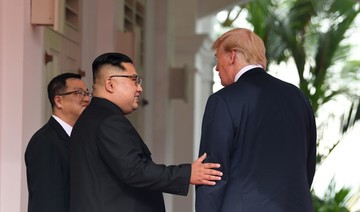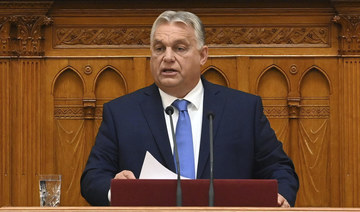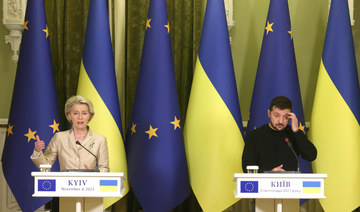PYONGYANG, North Korea: Reunification Highway runs all the way from the North Korean capital of Pyongyang to the Demilitarized Zone that divides the North from South Korea, 170 kilometers (100 miles) away. It starts under a giant concrete arch depicting two women in traditional gowns reaching out to each other and holding up a map of a unified Korea. Road signs along the way show the distance to Seoul, though it’s impossible to actually drive there.
The highway is one of the best in North Korea. It’s paved — a rarity in the North. It’s broad and visibility is generally good. But it’s also riddled with cracks and potholes. Lanes aren’t marked well, if at all. At night it’s pitch black, unless there are oncoming headlights. If it were on the South side, it wouldn’t be one of the best, it would be among the very worst.
Could fixing it help pave the way to denuclearization?
When South Korean President Moon Jae-in travels to Pyongyang this week for his third summit with North Korean leader Kim Jong Un, he will have two major tasks: He needs to keep Pyongyang’s talks with Washington on denuclearization from breaking down so that his own efforts at rapprochement can continue, and he needs to speed up a series of inter-Korean cooperation and engagement projects to keep frictions with the North low and his domestic critics at bay.
With each summit, the stakes get higher. It’s still unclear what Kim, riding a wave of successes in his debut on the world stage and fresh off a major celebration marking North Korea’s 70th anniversary, intends to do with his nuclear weapons. And pressure is mounting in the administration of President Donald Trump for quick and concrete progress.
Moon’s gamble has consistently been to pursue increased engagement on such things as joint projects to improve roads, railways and the North’s decrepit electricity grid with the big-ticket items that generally get all the headlines — denuclearization and a formal peace agreement for the Korean War, which ended in 1953 with what was intended to be a temporary armistice.
Moon’s approach hinges on the belief that better inter-Korean relations will naturally lower tensions and that joint projects to improve the North’s infrastructure are an investment in Korea’s future that has the potential to benefit both sides significantly in the long term.
Kim has been all ears.
His push this year to pursue better relations with the North’s neighbors, resulting in a flurry of summits with Moon and Chinese leader Xi Jinping and his meeting with Trump in June, was based on his claim that he had sufficiently built up his arsenal of long-range missiles and nuclear weapons and could shift his primary focus to improving the domestic economy.
Fixing the country’s infrastructure is a big part of that, and the reason why is telling.
Since assuming power after the death of his father in late 2011, Kim has allowed a market-based economy to grow significantly. The North remains decidedly socialist, and the role of the central government in economic planning and policies continues to be key. But the role of markets and capitalist-style entrepreneurialism has also become an established fact of daily life and an important income source for the regime.
Better roads and railways, and the ability to move goods and people quickly and reliably, would help such economic activity grow.
Kim has been surprisingly open about the sad state of his country’s transportation system. In his first summit with Moon, he expressed his “embarrassment” about the “poor transit infrastructure.” That same month, he conveyed his “uncontrollable grief” over the death of dozens of Chinese tourists whose bus plunged off a bridge near the city of Kaesong, which is close to the South Korean border.
Proposals to boost the North’s infrastructure go way back. They were an important part of the South’s “Sunshine” policies of the late 1990s to 2009, when the North conducted a nuclear test that sent relations into a rapid downward spiral. Seoul declared the policies a failure the following year, but Moon has wasted no time in trying to revive them.
In their first meeting, Moon laid out his plans for North Korean development on a USB memory stick.
Ultimately, South Korea wants to see a high-speed train linking its capital of Seoul to Pyongyang and farther north to Sinuiju, an important trade hub on the Chinese border. The price tag is a reported $35 billion. By the time the summit was over, both sides had agreed to work together to improve the roads and railways in what is called the eastern transportation corridor, and from Pyongyang to Sinuiju.
How far they will get remains to be seen. Similar plans have been kicking around for years, if not decades. Connecting the rail systems was on the agenda of a North-South summit in 2000 as well.
Moon’s vision goes well beyond Korea’s borders.
At an event last month, he said he wants to see the establishment of road and rail links with the North to deepen regional economic integration with China, the Russian Far East and even Mongolia. He said he wants this to get underway before the end of the year.
The biggest obstacle, however, might be the United States.
The US-led United Nations Command, which monitors activity around the DMZ, blocked plans for the North and South to conduct a field study of the North’s railroads last month. The plan was to run a train along a railway linking Seoul to Sinuiju.
The command reportedly refused to approve the plan because Seoul did not supply enough details.
Officials in Washington have also expressed concern that Seoul may be moving too fast and undermining support for trade sanctions that the US sees as one of its best means of keeping the pressure on Pyongyang high. The Trump administration says it will keep its “maximum pressure” policy and sanctions in place until the North demonstrates it is serious about denuclearization.
When Moon meets Kim: Can roads pave way to denuclearization?
When Moon meets Kim: Can roads pave way to denuclearization?

- Since assuming power after the death of his father in late 2011, Kim has allowed a market-based economy to grow significantly
- Korea’s 70th anniversary, intends to do with his nuclear weapons
UK minister accused of ‘witch hunt’ against pro-Palestine movement

- Michael Gove: University encampments represent ‘antisemitism repurposed for Instagram age’
- Palestine Solidarity Campaign: Britain ‘complicit’ in ‘genocide in Gaza’
LONDON: The UK’s secretary of state for leveling up, housing and communities has been accused of conducting a “witch hunt” after accusing pro-Palestinian demonstrators of antisemitism.
Political parties and the Palestine Solidarity Campaign condemned Michael Gove, with the Revolutionary Communist Party calling his accusations an attempt to distract from the Conservatives’ “support for genocide” in Gaza.
The Socialist Workers Party said he is conducting a “witch hunt (against) the Palestine solidarity movement.”
Gove announced plans to make protest organizers foot the cost of policing at pro-Palestinian demonstrations, saying they are not doing enough to stop some attendees spreading anti-Jewish messages.
“Many of those on these marches are thoughtful, gentle, compassionate people — driven by a desire for peace and an end to suffering. But they are side by side with those who are promoting hate,” he added.
“The organizers of these marches could do everything in their power to stop that. They don’t.”
Gove also said pro-Palestinian university encampments across the UK represent “antisemitism repurposed for the Instagram age,” and their presence has facilitated hostility against Jewish students on campuses.
Ben Jamal, PSC director, said in a statement: “Apologists for Israel’s genocidal violence and system of apartheid have lost the democratic and legal arguments, but continue to attempt to delegitimize Palestinian solidarity. They will not succeed.
“At a moment when Israel is on trial in the world’s highest court for the crime of genocide and the day after its Prime Minister has been threatened with ICC (International Criminal Court) arrest warrants for war crimes, it is grotesque that these smears continue.
“The real issues are that the UK government continues to arm Israel, refuses to resume funding to UNRWA (the UN Relief and Works Agency for Palestine Refugees), and is attempting to protect Israel from legal accountability.
“Far from stopping the genocide in Gaza as required under international law, the UK is complicit.”
NGOs seek climate trial of French oil giant TotalEnergies

- The complaint was filed at Paris judicial court days before TotalEnergies holds annual shareholders meeting
- The offenses carry prison sentences ranging between one year to five years and fines of as much as $163,000
PARIS: NGOs filed a criminal complaint against French oil giant TotalEnergies and its top shareholders in Paris on Tuesday, seeking a trial for involuntary manslaughter and other consequences of climate change “chaos.”
The case targets the company’s board, including chief executive Patrick Pouyanne, and major shareholders that backed its climate strategy, including US investment firm BlackRock and Norway’s central bank, Norges Bank.
In a statement, the three NGOs and eight individuals said they accused the group of “deliberately endangering the lives of others, involuntary manslaughter, neglecting to address a disaster, and damaging biodiversity.”
The complaint was filed at the Paris judicial court, which has environmental and health departments, three days before TotalEnergies holds its annual shareholders meeting.
The prosecutor now has three months to decide whether to open a judicial investigation, the NGOs said. If it does not go ahead, the plaintiffs can take their case directly before an investigative judge.
The offenses carry prison sentences ranging between one year to five years and fines of as much as 150,000 euros ($163,000).
“This legal action could set a precedent in the history of climate litigation as it opens the way to holding fossil fuel producers and shareholders responsible before criminal courts for the chaos caused by climate change,” the NGOs said.
The plaintiffs include “victims or survivors of climate-related disasters” in Australia, Belgium, France, Greece, Pakistan, the Philippines and Zimbabwe.
TotalEnergies did not immediately return a request for comment.
Oil and gas companies, other corporations and governments are facing a growing number of legal cases related to the climate crisis worldwide.
TotalEnergies is facing other legal cases in France related to climate change.
Outside the Paris judicial court, the NGOs held a banner reading “climate change kills” and “let’s put shareholders behind bars” — with the “share” in shareholders crossed out and replaced by the “death.”
The latest complaint aims to “recognize the deadly consequences of their decisions, their stubbornness in voting for fossil projects which threaten the stability of the climate and therefore of all living things,” Claire Nouvian, founding director of conservation group Bloom, said at a news conference.
Fossil fuels — oil, gas and coal — are the biggest contributors to heat-trapping greenhouse gas emissions.
One of the plaintiffs in the Paris case is Benjamin Van Bunderen Robberechts, a 17-year-old Belgian whose friend Rosa died in flash floods in Belgium at the age of 15 in 2021.
In Paris to file the complaint, he said he had come to “demand justice” against those “who choose profit over human lives and climate.”
In their statement, the plaintiffs said “TotalEnergies has known the direct link between its activities and climate change” since at least 1971.
“TotalEnergies followed a climate skeptic line in order to waste time, delay decision-making and protect its increasing investments in fossil fuels,” they added.
They said they hope to set a legal precedent “whereby opening new fossil fuel projects would be considered criminal.”
While the case was filed on Tuesday, TotalEnergies announced a deepwater project off the coast of Angola, with production set to start in 2028 to extract 70,000 barrels per day.
Gunmen kill around 40 people in attack in northcentral Nigeria: official

- Armed men invaded Zurak community, shooting sporadically and torching houses
- Local youth leader Shafi’i Sambo also said at least 42 people had been killed in the raid
LAGOS: Gunmen riding motorbikes killed around 40 people in a raid on a mining community in northcentral Nigeria, opening fire on residents and torching homes, the local government said on Tuesday.
The attack late on Monday on Wase district in Plateau state was the latest violence in an area which has long been a flashpoint for disputes over resources and for outbreaks of intercommunal clashes.
Armed men invaded Zurak community, shooting sporadically and torching houses, Plateau state commissioner for information Musa Ibrahim Ashoms told AFP by telephone.
“As we speak, about 40 people have been confirmed dead. Zurak is a popular mining community,” he said.
Local youth leader Shafi’i Sambo also said at least 42 people had been killed in the raid.
Wase has deposits of zinc and lead, while Plateau as a whole is known for its tin mining industry.
Sitting on the dividing line between Nigeria’s mostly Muslim north and predominantly Christian south, Plateau often sees outbreaks of violence sparked by disputes between nomadic herders and pastoral farmers.
Climate change has also helped escalate tensions over grazing land, water access and other resources such as the state’s metal reserves.
Parts of northwest and northcentral Nigeria have also been terrorized by heavily armed criminal gangs, who raid villages to loot and carry out mass kidnappings for ransom.
In January, intercommunal clashes erupted in Plateau’s Mangu town that left churches and mosques burned, more than 50 people dead and thousands displaced.
Over 3,000 Ukrainian inmates seek to join military

- Ukraine is suffering critical ammunition and manpower shortages on the battlefield
- “We predicted this before the adoption of this law,” Deputy Minister of Justice Olena Vysotska said
KYIV: Thousands of Ukrainian inmates are seeking to join the military, Kyiv said Tuesday, following a decision by lawmakers enabling some categories of prisoners to join the armed forces.
The move echoes a policy in Russia, where tens of thousands of prisoners have been sent to Ukraine with the promise of amnesty and were killed in gruelling battles that produced few gains.
Ukraine is suffering critical ammunition and manpower shortages on the battlefield that have allowed Russian forces to advance on the eastern and northern front lines.
“This is more than 3,000 people. We predicted this before the adoption of this law,” Deputy Minister of Justice Olena Vysotska said, referring to the number of prisoners who have submitted applications to join the military.
She said authorities had identified 20,000 eligible prisoners and that of them, 4,500 had “expressed interest” in joining. She added that the figure was likely to fluctuate.
Only prisoners with fewer than three years left on their sentence can apply. Mobilized prisoners are granted parole rather than a pardon.
Among those not eligible to serve include those found guilty of sexual violence, killing two or more people, serious corruption and former high-ranking officials.
Russia has recruited prisoners to serve on the front lines since the first days of its invasion, initially offering presidential pardons for six months’ service.
EU states push for June start to Ukraine membership talks

- To actually begin the negotiations the bloc’s member states still have to sign off on a formal framework for the process
- At a meeting in Brussels, France’s EU affairs minister Jean-Noel Barrot called for “the effective opening of negotiations“
BRUSSELS: Several EU countries on Tuesday called for the bloc to start membership negotiations with Ukraine and Moldova in June, but Hungary threatened to throw a spanner in the works.
The 27-nation EU took the landmark step in December of agreeing to open talks on its war-torn neighbor — and fellow ex-Soviet state Moldova — joining the club.
But to actually begin the negotiations the bloc’s member states still have to sign off on a formal framework for the process, proposed in March by Brussels.
At a meeting in Brussels, France’s EU affairs minister Jean-Noel Barrot called for “the effective opening of negotiations” before Belgium’s rotating presidency concludes at the end of June.
That statement was echoed by other ministers — including from Ireland and Sweden.
The push to move Ukraine onto the next step in its quest for EU membership comes amid fears that Hungary, the friendliest country with Moscow in the bloc, could stall progress when it takes over the presidency after Belgium.
Budapest has been hostile to Kyiv’s bid to join, arguing that Ukraine is getting pushed ahead in the queue without meeting the required criteria.
“There can be no exception on the basis of political or ideological considerations,” Hungarian minister Zoltan Kovacs said.
“There is very little, if any, progress. Again, I can repeat to you that membership, approval should be a merit based process. No exceptions.”
Another possible hurdle could come from a new right-wing government being formed in The Netherlands opposed to any new enlargement of the bloc.
Ukraine applied to join the EU shortly after Russia launched all-out invasion in February 2022.
Starting the negotiations would put Ukraine still only at the start of what is likely to be a years-long process of reforms before it can finally become a member.


















